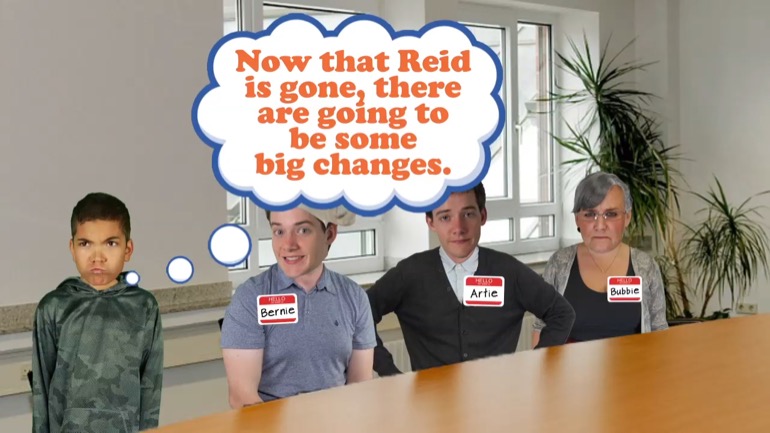ShmoopTube
Where Monty Python meets your 10th grade teacher.
Search Thousands of Shmoop Videos
Personal Finance Videos 957 videos
What is bankruptcy? Deadbeats who can't pay their bills declare bankruptcy. Either they borrowed too much money, or the business fell apart. They t...
What's a dividend? At will, the board of directors can pay a dividend on common stock. Usually, that payout is some percentage less than 100 of ear...
How are risk and reward related? Take more risk, expect more reward. A lottery ticket might be worth a billion dollars, but if the odds are one in...
Principles of Finance: Unit 1, The Corporation Takes Shape 32 Views
Share It!
Description:
Okay, so it's time for the Sauce Company's next funding round. Let's see if they can obtain the capital they need for growth. Not the growth, by the way, that occurs from ingesting a bit too much of the sauce.
Transcript
- 00:00
finance a la shmoop. What is the difference between progressive and
- 00:06
regressive taxes? ah politics. listen to these two words - progressive - sounds good [flag shown]
- 00:15
right? Like a bunch of happy face emojis, a new puppy, or a bright shiny new
- 00:20
electric car moving forward. Pro. Positive. Good. Alright now, what about regressive, evil. [ electric car plugged in]
- 00:27
like going backward. regressing. So, if ever you thought that finance wasn't
Full Transcript
- 00:32
political, well you were so wrong. about a century ago the notion was carried in
- 00:37
the country, that the rich benefit more from society so they should be taxed at [old time city shown]
- 00:43
higher rates .Not ridiculous logic, and probably both left and right can agree
- 00:48
that this notion applies in many cases. But, there's a backdrop here of degree,
- 00:53
meaning how much taxing of the rich is enough? And, how much is too much? So a [ man talking, definitions shown]
- 00:59
progressive tax system taxes people something like - this and every year the
- 01:04
numbers change- so we're just rounding here they to, you know, give you the
- 01:08
gist. Tax free! Ok, so progressive rates might start at like zero tax for the [ chart shown]
- 01:14
first ten thousand dollars of earnings then from 10,000 and 25,000 the rates 10
- 01:19
percent and from 25,000 40,000 the rate might be twenty percent then from 40,000
- 01:24
80,000 rate might be thirty percent and from 80,000 to like a gajillion the rate
- 01:28
might be forty percent . So that's progressive - that is the rate itself- the
- 01:33
tax rate itself goes higher as you earn more money. So let's say you earn 90
- 01:38
grand a year. Remember, that on your first 10,000 you paid no tax. But, if you earned
- 01:43
ninety thousand bucks that year well then on that last ten grand
- 01:48
I either move from 80,000 to 90,000 earnings, representing all that overtime
- 01:53
you put in on weekends and evenings. Well, that last marginal $10,000 gets taxed at [man sleeping at computer]
- 02:01
a forty percent rate! So you keep only six thousand bucks of the ten grand you
- 02:06
worked so hard to earn. You should have been just lazy and
- 02:09
stayed at home instead. And you remember that fact darkly when you try to save up [bag of money]
- 02:13
for your first home. yeah. it's hard to save money, the more money
- 02:17
you make. All right, well anyway that's progressive. The opposite is regressive,
- 02:21
which at its heart doesn't seem particularly evil or bad at all, it just [man talking]
- 02:26
means that everyone is taxed at the same rate. So on a gallon of gas that Bill
- 02:30
Gates consumes, which costs him three bucks a gallon and carries with it and [red car at gas station]
- 02:34
about a dollar in tax, well Bill pays the same tax on that gas as Polly poor
- 02:39
mouse, a waitress at Keens Diner. Rich and poor, in a regressive system pay the
- 02:44
same amount of tax on a gallon of gas and that is considered regressive. The [definition shown]
- 02:49
reason? well Polly's broke and Bill isn't. That dollar
- 02:53
of tax represents a bigger proportion of her income, than it does of his, hence the
- 02:58
scary regressive word. But, we're not making an argument here politically
- 03:03
either way, so don't shoot the messenger. no matter what your view is on a [man holds out hands]
- 03:06
progressive versus a regressive tax system, there's one thing everyone can
- 03:11
agree about where taxes are concerned. It's that you better pay them when the [man screams as he opens front door]
- 03:16
suits come a-knockin, or else.
Related Videos
GED Social Studies 1.1 Civics and Government
What is bankruptcy? Deadbeats who can't pay their bills declare bankruptcy. Either they borrowed too much money, or the business fell apart. They t...
What's a dividend? At will, the board of directors can pay a dividend on common stock. Usually, that payout is some percentage less than 100 of ear...
How are risk and reward related? Take more risk, expect more reward. A lottery ticket might be worth a billion dollars, but if the odds are one in...





































































































